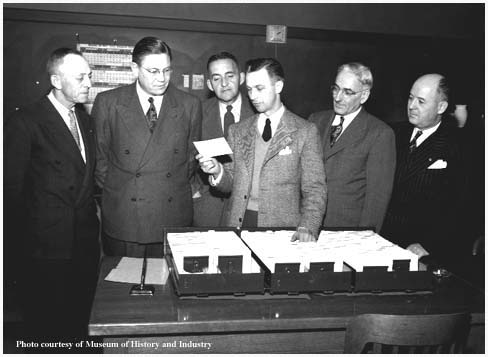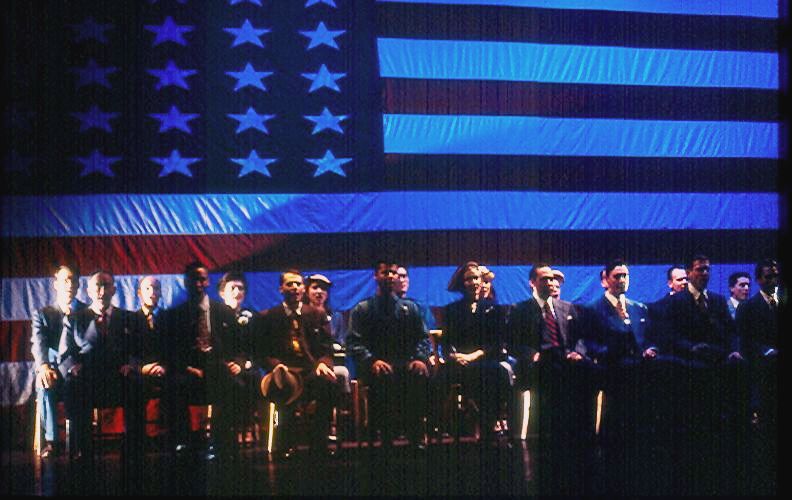
Representative Albert Canwell (center) and members of the Joint Legislative Fact Finding Committee in 1948. Courtesy Museum of History and Industry.
The Cold War began in 1946 as the U.S. and the USSR turned from reluctant allies into avowed enemies after the end of World War II. Worry about domestic Communists soon followed and Republicans capitalized on the issue in the November 1946 elections, winning control of Congress and in Washington State winning control of the legislature. Anti-communist legislation emerged from both bodies in 1947. Congress passed the Taft-Hartley Act that banned Communists from holding union leadership position, President Harry Truman issued an executive order requiring loyalty oaths of all federal employees, and in Olympia the legislature passed a resolution authorizing a widespread investigation into communist activities in Washington State. The hearings that followed would make headlines across the nation, and other states would soon join
Albert F. Canwell, newly elected Republican state representative from Spokane, introduced the successful bill and became chair of of the Joint Legislative Fact-Finding Committee on Un-American Activities that began work in early 1948. The first set of hearings focused on the Washington Pension Union, an advocacy group that had won increased social security benefits for seniors and pensions for single mothers. In carefully orchestrated testimony, a parade of friendly witnesses claimed that the WPU served as a front-group for the Communist Party.
Next, the committee took aim at the University of Washington, where one politician claimed there were over 100 Communists on the university faculty. Canwell initially planned to force forty faculty members to testify, but shortened his list to twelve before the July, 1948 hearings got underway. In the aftermath,six tenured faculty members would face sanctions from the University and three would lose their jobs.
The Canwell investigations had widespread effects. They changed the tone of political life in Washington State and launched an era of trouble for the Communist Party and for current and former members, many of whom would face harrassment, some losing jobs, and a few going to jail. Attracting headlines around the country, the investigations inspired other state legislatures and other universities to follow the Washington example and begin to look for radicals in their schools, universities, and other institutions.
Transcripts of the hearings witnesses and testimony
Albert Canwell 1994 video interview: In 1994 as he was beginning research for his play All Powers Necessary and Contingent, Professor Mark Jenkins videotaped an extensive and revealing interview with Albert Canwell.
Albert Canwell 1997 oral history transcript: This interview by Timothy Frederick for the Washington State Oral History Project runs 421 pages. Pdf copy is from https://app.leg.wa.gov/oralhistory/canwell.pdf
John Caughlan video interview: The lead attorney for the UW professors who were defendants in the hearings, Caughlan was a founder of the Seattle chapter of the Civil Rights Congress and devoted most of his legal career to defending radicals and civil rights activists. Mark Jenkins interviewed him in 1994.
B.J. Mangaoang video interview and Lonnie Nelson video interview both contain fascinating details about the experience of being persecuted during the Canwell era.

Flag-backed stage in the Playhouse Theater and a scene from "All Powers Necessary and Contingent" Fifty years later, in February, 1998, Seattle once again watched Albert Canwell and his committee hunt communists at the University of Washington, this time as part of a remarkable play written by Mark Jenkins. All Powers Necessary and Convenient took its title from the enabling legislation that created the Joint Legislative Fact-Finding Committee on Un-American Activities. Produced by the UW School of Drama and featuring a cast of nearly 30 actors, the play used actual testimony to recreate the tense drama of accusation, intimidation, and courage that had unfolded a half century earlier. Large audiences filled the playhouse theater for each performance and attended the lectures and other public events that accompanied the play. And it was quickly apparent that something unique was happening. All Powers had brought history to life at an important moment, helping several generations come to terms with an important episode in their collective past.
All Powers Necessary and Convenient: Here is the story of the 1998 play by Mark Jenkins that recreated the Canwell hearings. Read the preface and see photos and other materials from the performance and associated events.
Survivor Stories: An important discussion followed one of the performances of All Powers Necessary and Convenient. Playwright Mark Jenkins spoke briefly and then the audience talked, including many who took part in the events of 1948.